Jean-Christophe Gagnon-Audet
AIRS-Bench: a Suite of Tasks for Frontier AI Research Science Agents
Feb 09, 2026Abstract:LLM agents hold significant promise for advancing scientific research. To accelerate this progress, we introduce AIRS-Bench (the AI Research Science Benchmark), a suite of 20 tasks sourced from state-of-the-art machine learning papers. These tasks span diverse domains, including language modeling, mathematics, bioinformatics, and time series forecasting. AIRS-Bench tasks assess agentic capabilities over the full research lifecycle -- including idea generation, experiment analysis and iterative refinement -- without providing baseline code. The AIRS-Bench task format is versatile, enabling easy integration of new tasks and rigorous comparison across different agentic frameworks. We establish baselines using frontier models paired with both sequential and parallel scaffolds. Our results show that agents exceed human SOTA in four tasks but fail to match it in sixteen others. Even when agents surpass human benchmarks, they do not reach the theoretical performance ceiling for the underlying tasks. These findings indicate that AIRS-Bench is far from saturated and offers substantial room for improvement. We open-source the AIRS-Bench task definitions and evaluation code to catalyze further development in autonomous scientific research.
A Scalable Measure of Loss Landscape Curvature for Analyzing the Training Dynamics of LLMs
Jan 23, 2026Abstract:Understanding the curvature evolution of the loss landscape is fundamental to analyzing the training dynamics of neural networks. The most commonly studied measure, Hessian sharpness ($λ_{\max}^H$) -- the largest eigenvalue of the loss Hessian -- determines local training stability and interacts with the learning rate throughout training. Despite its significance in analyzing training dynamics, direct measurement of Hessian sharpness remains prohibitive for Large Language Models (LLMs) due to high computational cost. We analyze $\textit{critical sharpness}$ ($λ_c$), a computationally efficient measure requiring fewer than $10$ forward passes given the update direction $Δ\mathbfθ$. Critically, this measure captures well-documented Hessian sharpness phenomena, including progressive sharpening and Edge of Stability. Using this measure, we provide the first demonstration of these sharpness phenomena at scale, up to $7$B parameters, spanning both pre-training and mid-training of OLMo-2 models. We further introduce $\textit{relative critical sharpness}$ ($λ_c^{1\to 2}$), which quantifies the curvature of one loss landscape while optimizing another, to analyze the transition from pre-training to fine-tuning and guide data mixing strategies. Critical sharpness provides practitioners with a practical tool for diagnosing curvature dynamics and informing data composition choices at scale. More broadly, our work shows that scalable curvature measures can provide actionable insights for large-scale training.
What Does It Take to Be a Good AI Research Agent? Studying the Role of Ideation Diversity
Nov 19, 2025Abstract:AI research agents offer the promise to accelerate scientific progress by automating the design, implementation, and training of machine learning models. However, the field is still in its infancy, and the key factors driving the success or failure of agent trajectories are not fully understood. We examine the role that ideation diversity plays in agent performance. First, we analyse agent trajectories on MLE-bench, a well-known benchmark to evaluate AI research agents, across different models and agent scaffolds. Our analysis reveals that different models and agent scaffolds yield varying degrees of ideation diversity, and that higher-performing agents tend to have increased ideation diversity. Further, we run a controlled experiment where we modify the degree of ideation diversity, demonstrating that higher ideation diversity results in stronger performance. Finally, we strengthen our results by examining additional evaluation metrics beyond the standard medal-based scoring of MLE-bench, showing that our findings still hold across other agent performance metrics.
Scaling and Distilling Transformer Models for sEMG
Jul 29, 2025Abstract:Surface electromyography (sEMG) signals offer a promising avenue for developing innovative human-computer interfaces by providing insights into muscular activity. However, the limited volume of training data and computational constraints during deployment have restricted the investigation of scaling up the model size for solving sEMG tasks. In this paper, we demonstrate that vanilla transformer models can be effectively scaled up on sEMG data and yield improved cross-user performance up to 110M parameters, surpassing the model size regime investigated in other sEMG research (usually <10M parameters). We show that >100M-parameter models can be effectively distilled into models 50x smaller with minimal loss of performance (<1.5% absolute). This results in efficient and expressive models suitable for complex real-time sEMG tasks in real-world environments.
AI Research Agents for Machine Learning: Search, Exploration, and Generalization in MLE-bench
Jul 03, 2025Abstract:AI research agents are demonstrating great potential to accelerate scientific progress by automating the design, implementation, and training of machine learning models. We focus on methods for improving agents' performance on MLE-bench, a challenging benchmark where agents compete in Kaggle competitions to solve real-world machine learning problems. We formalize AI research agents as search policies that navigate a space of candidate solutions, iteratively modifying them using operators. By designing and systematically varying different operator sets and search policies (Greedy, MCTS, Evolutionary), we show that their interplay is critical for achieving high performance. Our best pairing of search strategy and operator set achieves a state-of-the-art result on MLE-bench lite, increasing the success rate of achieving a Kaggle medal from 39.6% to 47.7%. Our investigation underscores the importance of jointly considering the search strategy, operator design, and evaluation methodology in advancing automated machine learning.
GOKU-UI: Ubiquitous Inference through Attention and Multiple Shooting for Continuous-time Generative Models
Jul 11, 2023



Abstract:Scientific Machine Learning (SciML) is a burgeoning field that synergistically combines domain-aware and interpretable models with agnostic machine learning techniques. In this work, we introduce GOKU-UI, an evolution of the SciML generative model GOKU-nets. The GOKU-UI broadens the original model's spectrum to incorporate other classes of differential equations, such as Stochastic Differential Equations (SDEs), and integrates a distributed, i.e. ubiquitous, inference through attention mechanisms and a novel multiple shooting training strategy in the latent space. These enhancements have led to a significant increase in its performance in both reconstruction and forecast tasks, as demonstrated by our evaluation of simulated and empirical data. Specifically, GOKU-UI outperformed all baseline models on synthetic datasets even with a training set 32-fold smaller, underscoring its remarkable data efficiency. Furthermore, when applied to empirical human brain data, while incorporating stochastic Stuart-Landau oscillators into its dynamical core, it not only surpassed state-of-the-art baseline methods in the reconstruction task, but also demonstrated better prediction of future brain activity up to 12 seconds ahead. By training GOKU-UI on resting-state fMRI data, we encoded whole-brain dynamics into a latent representation, learning an effective low-dimensional dynamical system model that could offer insights into brain functionality and open avenues for practical applications such as mental state or psychiatric condition classification. Ultimately, our research provides further impetus for the field of Scientific Machine Learning, showcasing the potential for advancements when established scientific insights are interwoven with modern machine learning.
WOODS: Benchmarks for Out-of-Distribution Generalization in Time Series Tasks
Mar 18, 2022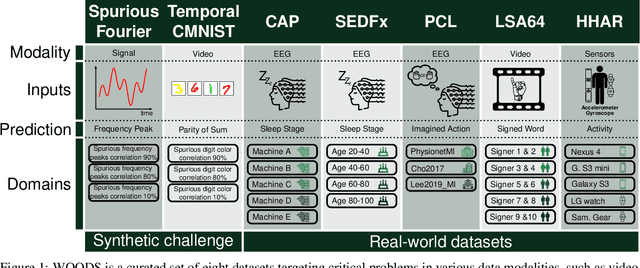
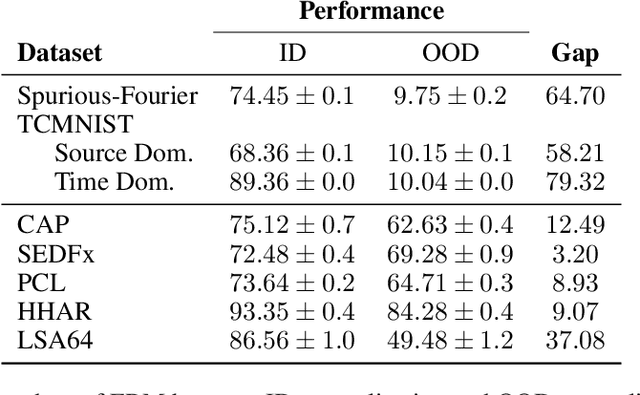
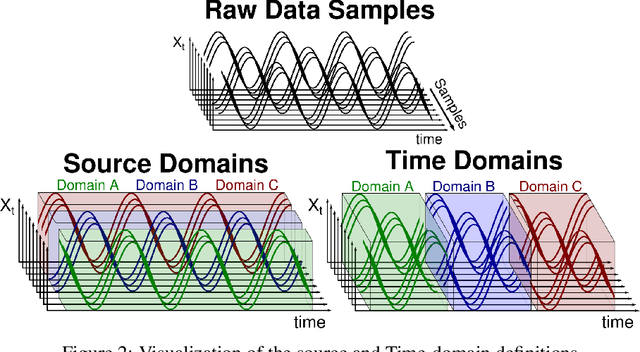

Abstract:Machine learning models often fail to generalize well under distributional shifts. Understanding and overcoming these failures have led to a research field of Out-of-Distribution (OOD) generalization. Despite being extensively studied for static computer vision tasks, OOD generalization has been underexplored for time series tasks. To shine light on this gap, we present WOODS: eight challenging open-source time series benchmarks covering a diverse range of data modalities, such as videos, brain recordings, and sensor signals. We revise the existing OOD generalization algorithms for time series tasks and evaluate them using our systematic framework. Our experiments show a large room for improvement for empirical risk minimization and OOD generalization algorithms on our datasets, thus underscoring the new challenges posed by time series tasks. Code and documentation are available at https://woods-benchmarks.github.io .
SAND-mask: An Enhanced Gradient Masking Strategy for the Discovery of Invariances in Domain Generalization
Jun 04, 2021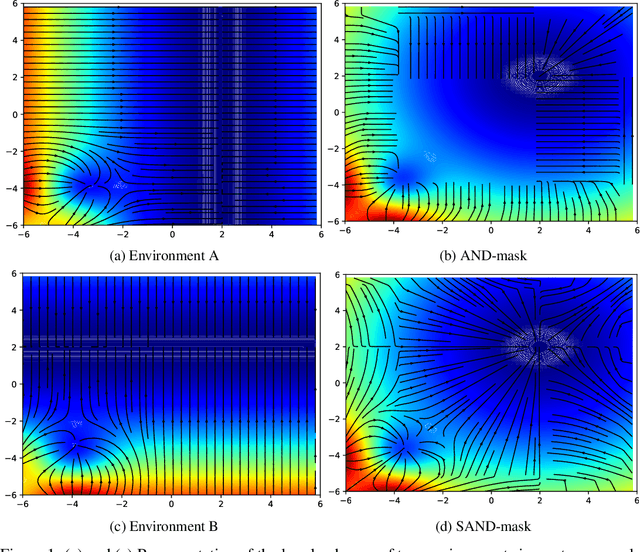
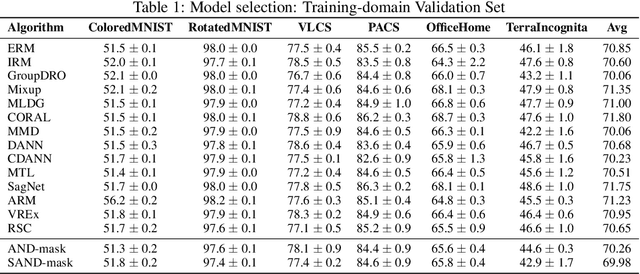

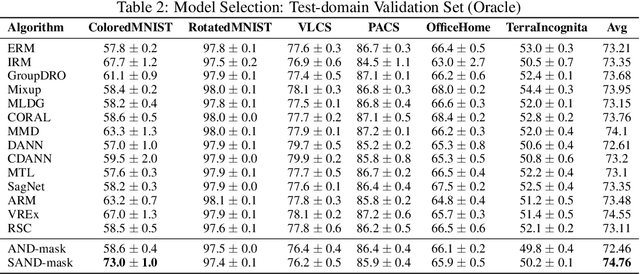
Abstract:A major bottleneck in the real-world applications of machine learning models is their failure in generalizing to unseen domains whose data distribution is not i.i.d to the training domains. This failure often stems from learning non-generalizable features in the training domains that are spuriously correlated with the label of data. To address this shortcoming, there has been a growing surge of interest in learning good explanations that are hard to vary, which is studied under the notion of Out-of-Distribution (OOD) Generalization. The search for good explanations that are \textit{invariant} across different domains can be seen as finding local (global) minimas in the loss landscape that hold true across all of the training domains. In this paper, we propose a masking strategy, which determines a continuous weight based on the agreement of gradients that flow in each edge of network, in order to control the amount of update received by the edge in each step of optimization. Particularly, our proposed technique referred to as "Smoothed-AND (SAND)-masking", not only validates the agreement in the direction of gradients but also promotes the agreement among their magnitudes to further ensure the discovery of invariances across training domains. SAND-mask is validated over the Domainbed benchmark for domain generalization and significantly improves the state-of-the-art accuracy on the Colored MNIST dataset while providing competitive results on other domain generalization datasets.
 Add to Chrome
Add to Chrome Add to Firefox
Add to Firefox Add to Edge
Add to Edge